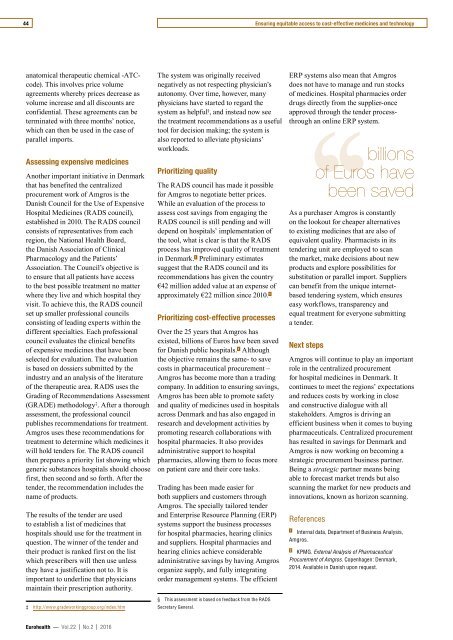EUROHEALTH
Eurohealth-volume22-number2-2016
Eurohealth-volume22-number2-2016
Create successful ePaper yourself
Turn your PDF publications into a flip-book with our unique Google optimized e-Paper software.
44<br />
Ensuring eeuitable access to cost-effective medicines and technology<br />
anatomical therapeutic chemical -ATCcode).<br />
This involves price volume<br />
agreements whereby prices decrease as<br />
volume increase and all discounts are<br />
confidential. These agreements can be<br />
terminated with three months’ notice,<br />
which can then be used in the case of<br />
parallel imports.<br />
Assessing expensive medicines<br />
Another important initiative in Denmark<br />
that has benefited the centralized<br />
procurement work of Amgros is the<br />
Danish Council for the Use of Expensive<br />
Hospital Medicines (RADS council),<br />
established in 2010. The RADS council<br />
consists of representatives from each<br />
region, the National Health Board,<br />
the Danish Association of Clinical<br />
Pharmacology and the Patients’<br />
Association. The Council’s objective is<br />
to ensure that all patients have access<br />
to the best possible treatment no matter<br />
where they live and which hospital they<br />
visit. To achieve this, the RADS council<br />
set up smaller professional councils<br />
consisting of leading experts within the<br />
different specialties. Each professional<br />
council evaluates the clinical benefits<br />
of expensive medicines that have been<br />
selected for evaluation. The evaluation<br />
is based on dossiers submitted by the<br />
industry and an analysis of the literature<br />
of the therapeutic area. RADS uses the<br />
Grading of Recommendations Assessment<br />
(GRADE) methodology ‡ . After a thorough<br />
assessment, the professional council<br />
publishes recommendations for treatment.<br />
Amgros uses these recommendations for<br />
treatment to determine which medicines it<br />
will hold tenders for. The RADS council<br />
then prepares a priority list showing which<br />
generic substances hospitals should choose<br />
first, then second and so forth. After the<br />
tender, the recommendation includes the<br />
name of products.<br />
The results of the tender are used<br />
to establish a list of medicines that<br />
hospitals should use for the treatment in<br />
question. The winner of the tender and<br />
their product is ranked first on the list<br />
which prescribers will then use unless<br />
they have a justification not to. It is<br />
important to underline that physicians<br />
maintain their prescription authority.<br />
‡ http://www.gradeworkinggroup.org/index.htm<br />
The system was originally received<br />
negatively as not respecting physician’s<br />
autonomy. Over time, however, many<br />
physicians have started to regard the<br />
system as helpful § , and instead now see<br />
the treatment recommendations as a useful<br />
tool for decision making; the system is<br />
also reported to alleviate physicians’<br />
workloads.<br />
Prioritizing quality<br />
The RADS council has made it possible<br />
for Amgros to negotiate better prices.<br />
While an evaluation of the process to<br />
assess cost savings from engaging the<br />
RADS council is still pending and will<br />
depend on hospitals’ implementation of<br />
the tool, what is clear is that the RADS<br />
process has improved quality of treatment<br />
in Denmark. 1 Preliminary estimates<br />
suggest that the RADS council and its<br />
recommendations has given the country<br />
€42 million added value at an expense of<br />
approximately €22 million since 2010. 1<br />
Prioritizing cost-effective processes<br />
Over the 25 years that Amgros has<br />
existed, billions of Euros have been saved<br />
for Danish public hospitals. 1 Although<br />
the objective remains the same- to save<br />
costs in pharmaceutical procurement –<br />
Amgros has become more than a trading<br />
company. In addition to ensuring savings,<br />
Amgros has been able to promote safety<br />
and quality of medicines used in hospitals<br />
across Denmark and has also engaged in<br />
research and development activities by<br />
promoting research collaborations with<br />
hospital pharmacies. It also provides<br />
administrative support to hospital<br />
pharmacies, allowing them to focus more<br />
on patient care and their core tasks.<br />
Trading has been made easier for<br />
both suppliers and customers through<br />
Amgros. The specially tailored tender<br />
and Enterprise Resource Planning (ERP)<br />
systems support the business processes<br />
for hospital pharmacies, hearing clinics<br />
and suppliers. Hospital pharmacies and<br />
hearing clinics achieve considerable<br />
administrative savings by having Amgros<br />
organize supply, and fully integrating<br />
order management systems. The efficient<br />
§ This assessment is based on feedback from the RADS<br />
Secretary General.<br />
ERP systems also mean that Amgros<br />
does not have to manage and run stocks<br />
of medicines. Hospital pharmacies order<br />
drugs directly from the supplier-once<br />
approved through the tender processthrough<br />
an online ERP system.<br />
of Euros have<br />
been saved<br />
‘‘billions<br />
As a purchaser Amgros is constantly<br />
on the lookout for cheaper alternatives<br />
to existing medicines that are also of<br />
equivalent quality. Pharmacists in its<br />
tendering unit are employed to scan<br />
the market, make decisions about new<br />
products and explore possibilities for<br />
substitution or parallel import. Suppliers<br />
can benefit from the unique internetbased<br />
tendering system, which ensures<br />
easy workflows, transparency and<br />
equal treatment for everyone submitting<br />
a tender.<br />
Next steps<br />
Amgros will continue to play an important<br />
role in the centralized procurement<br />
for hospital medicines in Denmark. It<br />
continues to meet the regions’ expectations<br />
and reduces costs by working in close<br />
and constructive dialogue with all<br />
stakeholders. Amgros is driving an<br />
efficient business when it comes to buying<br />
pharmaceuticals. Centralized procurement<br />
has resulted in savings for Denmark and<br />
Amgros is now working on becoming a<br />
strategic procurement business partner.<br />
Being a strategic partner means being<br />
able to forecast market trends but also<br />
scanning the market for new products and<br />
innovations, known as horizon scanning.<br />
References<br />
1<br />
Internal data, Department of Business Analysis,<br />
Amgros.<br />
2<br />
KPMG. External Analysis of Pharmaceutical<br />
Procurement of Amgros. Copenhagen: Denmark,<br />
2014. Available in Danish upon request.<br />
Eurohealth — Vol.22 | No.2 | 2016
















